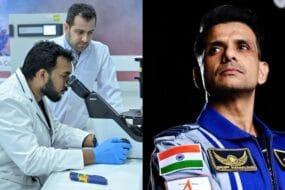- Home
- Space & Science
- India’s Leap into Space Lead ...

India’s space program has long stood as a beacon of ambition and efficiency. From sending a Mars orbiter on a budget smaller than a Hollywood movie to landing near the Moon’s South Pole with minimal cost, ISRO has time and again proven that great strides in space don’t require astronomical budgets.
Now, another historic milestone is on the horizon: India is sending its first Indian passport-holder, Group Captain Shubhanshu Shukla, to the International Space Station (ISS) as part of Axiom Mission 4 (Ax-4). Scheduled to launch on June 8, 2025, from NASA’s Kennedy Space Center aboard a SpaceX Falcon 9 rocket, the 14-day mission marks India’s debut in human space presence at the ISS.
Shukla, a decorated Indian Air Force pilot, will serve as the mission pilot, working alongside veteran NASA astronaut Peggy Whitson, with crew members from Poland and Hungary. Though the mission comes with a price tag of over Rs 500 crore, it’s being seen not as an expense, but a strategic investment in India’s long-term space ambitions.
Why It Matters
This mission will make Shukla only the second Indian to travel into space, after Rakesh Sharma in 1984. But more importantly, it signals India’s entry into the complex world of human spaceflight, ahead of ISRO’s own Gaganyaan mission and future plans for a Bharat Antariksha Station—India’s independent space station by 2035.
Beyond symbolism, Ax-4 is deeply rooted in science and collaboration. The crew will conduct nearly 60 research experiments, making it the most science-intensive Axiom mission yet. Of these, seven experiments are led by ISRO, exploring areas like space medicine, crop growth, muscle loss in microgravity, and algae behavior in space environments.
These studies are designed not only to push the boundaries of science but also to provide critical data for India’s upcoming human space missions.
Beyond Science: Inspiring a Nation
One of the most unique aspects of the Ax-4 mission is its educational outreach. The astronauts will connect with students across the globe—including India—through Ham radio sessions from space. These live conversations will give students a rare glimpse into life aboard the ISS, igniting the imagination of a new generation of space enthusiasts.
The Road Ahead
India’s space vision is rapidly expanding. The Gaganyaan mission, expected within the next two years, will carry Indian astronauts into low-Earth orbit. By 2028, ISRO plans to launch the first module of its own space station, with a full-scale Indian space lab orbiting Earth by 2035.
Group Captain Shubhanshu Shukla’s flight is more than just a historic mission—it’s India’s first human step toward a permanent presence in space. This mission is not just a journey of one man, but a defining moment for a nation reaching for the stars.















